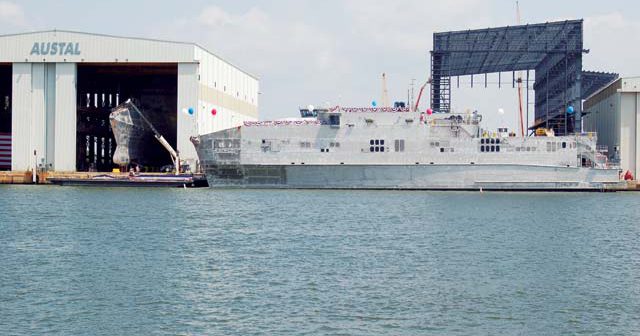Austal USA and the Navy’s Expeditionary Fast Transport (EPF) program successfully completed sea trials on the future Newport (EPF 12), in the Gulf of Mexico. The 337'10"x93"6" ship is now ready to be delivered to the Navy.
Austal USA has delivered 11 EPFs and has two more under construction, including EPF 12, at its Mobile, Ala., facility. The Spearhead-class EPF is provides high-speed, high-payload transport capability to fleet and combatant commanders.
Four MTU 20V8000 M7 11 diesel engines, producing 12,203 hp at 1,150 rpm each, supply the EPF with its main propulsion. The mains connect to four Wärtsilä WLD 1400 SR waterjets through ZF 60000R2H marine gears. Maximum speed without payload is 43 knots, with a running speed (with payload) of 35 knots. Its range is 1,200 nautical miles.
“I can’t begin to express how proud I am of the success of our team and this ship,” Austal USA President Craig Perciavalle said in a statement announcing the successful sea trials. “The ability to overcome the challenges presented to conduct something as complicated as vessel sea trials in these unprecedented times proves the value of hard work and dedication.”
The trials involved the execution of intense comprehensive tests by the Austal-led industry team while underway, which demonstrated to the Navy the successful operation of the ship’s major systems and equipment. Sea trials are the last milestone before delivery of the ship. Newport is slated for delivery to the Navy later this summer and is the twelfth ship in Austal USA’s growing 14-ship portfolio.
The EPF’s large, open mission deck and large habitability spaces provide the opportunity to conduct a wide range of missions from engagement and humanitarian assistance or disaster relief missions being conducted today, to the possibility of supporting a range of future missions including special operations support, command and control, and medical support operations. With its ability to access austere and degraded ports with minimal external assistance, the EPF provides unique options to fleet and combatant commanders.
“We’re proud of the contributions these ships are making to maritime operations around the world,” stated Perciavalle. “From serving as a mother ship to test drones in the Atlantic to providing humanitarian assistance and participating in global military training exercises enhancing the lifestyle and naval capabilities of third world nations, the EPF fleet is proving to be a great asset to our future 355-ship Navy.”
In addition to the EPF program, Austal has also received contracts for 19 Independence-variant littoral combat ships (LCS) for the Navy. Twelve LCSes have been delivered with an additional five ships in various stages of construction.



.JPG.small.400x400.jpg)

